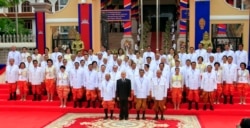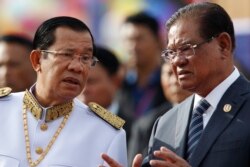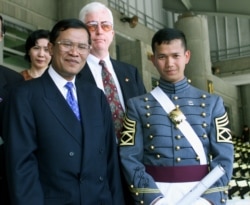For the first time in more than 30 years, Cambodia’s ruling party is set to select a new prime minister candidate when its central committee convenes on Christmas Eve to vote on Prime Minister Hun Sen’s proposal for his eldest son, Army Chief Lt. Gen. Hun Manet, to succeed him.
The prime minister is framing the succession, which would take place after 2028, as a generational transition of Cambodia’s political leadership. The old guard will step aside to be replaced by their progeny — with the Hun family still atop the ruling party apparatus. It would also likely cement Hun Manet as his 69-year-old father’s heir apparent should anything happen before then.
Analysts say the meeting of the 800-plus-member central committee will likely be the culmination of Hun Sen’s decades of consolidating control within the party, though it also risks exposing rare public rifts between senior party leaders.
“Hun Sen’s endorsement indicates and projects him speaking from a position of strength,” said Astrid Norén-Nilsson, a senior lecturer who studies Cambodian politics at Lund University in Sweden.
Norén-Nilsson notes the ruling party’s succession event is taking place right after the apparent meltdown of the main opposition coalition, the Cambodia National Rescue Party, already outlawed by the CPP loyalists-led Supreme Court.
“More generally speaking, now is a good and relatively quiet time to rally support around Manet, before going into the next electoral cycle,” she added. “For Hun Sen, it is certainly preferable to avoid the uncertainties generated by opening for an interim power-holder. Handing over directly to Manet means a greatly reduced risk of messy complications and the development of new and entangled agendas within the party.”
Hun Sen set the upcoming succession vote in motion after the December 2 speech in which he made his first public endorsement of Manet to succeed him as prime minister. However, the prime minister, who has been in power since 1985, seemingly prepared for this moment since becoming president of the party following Chea Sim’s death in 2015.
In early 2015, before Hun Sen’s takeover, the party’s central committee was composed of about 200 members, according to the CPP official document as of November 5. When the committee convened on Friday, its membership stood at 833 (compared to Vietnam’s Communist Party’s central committee, which has 180 members, and the Chinese Communist Party’s central committee with 205).
“The expansion of central committee members have both bolstered the PM’s standing within the party and served his succession plan,” said Norén-Nilsson, adding that many of the new members “can now be counted on to endorse Manet.”
CPP spokesperson Suos Yara said the size of the party central committee is justified, as the country’s population has grown from about 4 million people following the Khmer Rouge to 16 million people today. “So the number is not a subject that we should analyze,” he added.
The premier’s move to install his eldest son was hardly a surprise. Hun Sen called Hun Manet a “possible future leader” in a 2018 interview with Japanese news agency Kyodo. Soon after, he was promoted to serve both as the Royal Cambodian Armed Forces’ Deputy Commander-in-Chief and the Royal Cambodian Army Commander.
After playing a key role in building CPP networks abroad, mainly in countries where the opposition has strong support from the diaspora, Manet was later included in the CPP’s all-powerful standing committee in late 2018. In 2020, he was tapped to head the party’s youth wing.
The West Point alumnus was seen in a much-talked photo with Hun Sen and Chinese President Xi Jinping during the Prime Minister’s visit to Beijing in February 2020. And Manet and his wife Pich Chanmony were active in leading a pro bono medical team to assist the pandemic response in the past year.
And yet, the power play by Hun Sen has already exposed schisms within the party’s upper echelon.
Following Hun Sen’s endorsement of Manet, messages of enthusiastic support poured in from party members, loyalists, and business leaders. However, for days, there was a conspicuous silence from Interior Minister Sar Kheng, a deputy party president who inherited the rival faction of Chea Sim. And when Sar Kheng’s message finally came on December 7, unlike the others, he did not mention Manet, instead committing to “respecting the decisions of the CPP congress and convention" regarding future prime minister candidates. Interior Ministry spokesperson Khieu Sopheak could not be reached for comment.
Hun Sen appeared to shrug off the speculation surrounding public pronouncements in a speech on Dec. 9. “Whoever supports or not via a public endorsement does not matter,” he said. “What will be valid is the party central committee convention’s resolution,” he said, which will then be voted before the full party congress.
The core members of the politburo — consisting of himself, Senate President Say Chhum, and Deputy Prime Ministers Sar Kheng, Tea Banh, and Men Sam An — approved the “reserve cabinet”, mostly consisting of the educated children of senior party members, during a meeting on December 8, Hun Sen said.
The timing of the move has led some to speculate about Hun Sen’s health. However, Suos Yara, the CPP spokesman, said the convention was scheduled to respond to the eased domestic situation surrounding the COVID-19 pandemic.
“As I said, we are a family that normally the children listen to the father,” Suos Yara told VOA Khmer when asked about Manet’s candidacy.
However, Hun Manet’s allies are leaving nothing to chance, apparently worried that some wayward offspring might use the secret ballot to upset his standing at the convention, or back other candidates if there are any.
Soon after Hun Sen’s pronouncement, Manet’s aides from the party’s central youth wing came forward with a new series of pledges online that they will not only vote for Manet at the convention but will also take a photograph of their ballots as proof of “history of Cambodian political journey.”
Those aides include Heng Sour, Huot Hak, and Chrun Theravat, who are secretaries of state at labor, rural development, and parliamentary relations ministries.
Political commentator Ly Sreysrors, who leads the Young Analysts Group, said the campaigns for public support had the opposite effect of showing the internal party structure has not come “as one.”
“I dare not jump to an estimate with percentage. I dare to say that, based on the gestures and activities of some senior CPP figures, there could be some rival candidates to challenge Mr. Hun Manet as a premier candidate,” she said. “But I do think the prime minister is significantly confident that he nominates Mr. Hun Manet to the place with so much preparation that he can move to make Manet’s candidacy public.”
Sreysrors said she had mixed feelings about the new team of CPP leaders, most of whom grew up in luxury and studied abroad.
“As I said, the elevation of these offspring lacks, honestly speaking, integrity. This is a mere father-to-son power transfer. That gives me little hope for the improvement, and I think the dirty politics will continue,” Sreysrors said.
She added that if the new CPP leadership continues to weaken the ability of civil society and the public to engage politically, “they cannot lead Cambodia on a positive path.”







